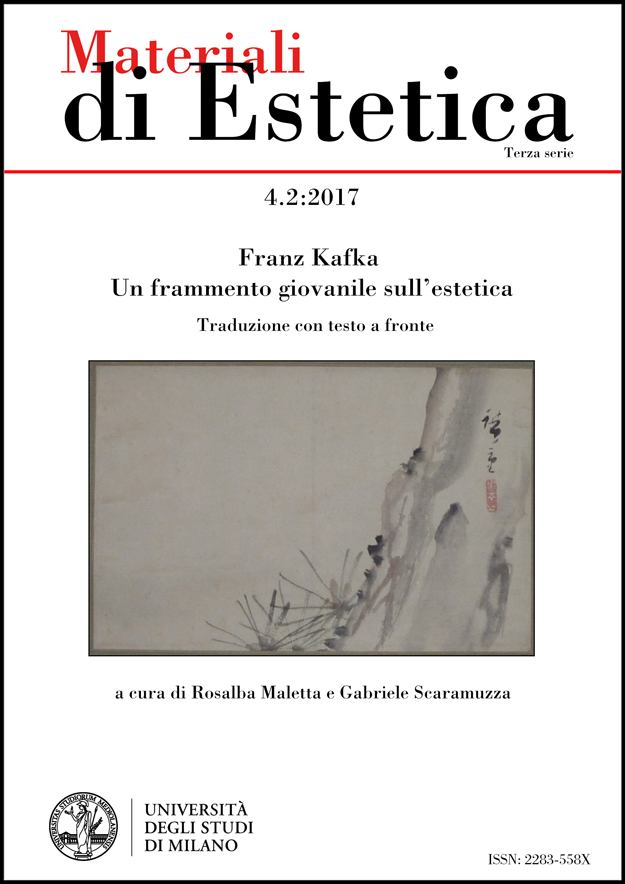“Man darf nicht sagen...”. Kafka’s 1906 fragment Über ästhetische Apperception („On Perception“)
DOI:
https://doi.org/10.13130/mde.v0i4.2.9781Abstract
Inspired by Scott Spector’s analysis of the Prague Circle, this article investigates how Kafka’s fragment “On Perception” (“Über ästhetische Apperception”) might be viewed as a product of the dialogue between Brod and Kafka. After surveying how Kafka scholars have framed and tried to apply Kafka’s early text on aesthetics, the article shows Kafka’s work refuses to engage with the powerful anti-Jewish tropes of aesthetic theory around 1900 (Weininger) and instead develops literary themes and techniques that anticipate many aspects of Kafka’s later literary production.
Keywords: Kafka; Brod; Herbart; apperception; modernity; Weininger; Jews; antisemitism
Downloads
Riferimenti bibliografici
ACHINGER, Christine, “Allegories of Destruction: ‘Woman’ and ‘the Jew’ in Otto Weininger’s Sex and Character”, in The Germanic Review, 88, 2 (2013).
ANDERSON, Mark “Kafka and New York: Notes on a Traveling Narrative”, in A. Huyssen, D. Bathrick, Modernity and the Text: Revisions of German Modernism, Columbia University Press, New York 1989. Reprinted in M. Anderson, Kafka’s Clothes: Ornament and Aestheticism in the Habsburg Fin de Siècle, Clarendon Press, Oxford 1992.
ANDERSON, Mark, “Anorexia and Modernism, or How I Learned to Diet in All Directions”, in Discourse, 11 (1988).
BEISER, Frederick C., Weltschmerz: Pessimism in German Philosophy, 1860-1900, Oxford University Press, Oxford 2016.
BROD, Max, “Ungedrucktes von Franz Kafka”, in Die Zeit, 22 October 1965, http://www.zeit.de/1965/43/ungedrucktes-von-franz-kafka. Reprinted in M. Brod, Der Prager Kreis, Kohlhammer, Stuttgart 1966.
–, “Zur Aesthetik”, in Die Gegenwart 69 (17.2.1906 and 24.2.1906).
CORNGOLD, Stanley, Complex Pleasure. Forms of Feeling in German Literature, Stanford 1998.
HEIDSIECK, Arnold, “Kafka’s Narrative Ontology”, in Philosophy and Literature, 11 (1987).
–, “Physiological, Phenomenological, and Linguistic Psychology in Kafka’s Early Works”, in The German Quarterly, 62, 4 (1989).
–, The Intellectual Contexts of Kafka’s Fiction: Philosophy, Law, Religion, S.C. Camden House, Columbia 1994.
HEINZ, Jutta, Kafka-Handbuch: Leben-Wek-Wirkung, eds. M. Engel and B. Auerochs, J.B. Metzler, Stuttgart 2010.
KAFKA, Franz, Nachgelassene Schriften und Fragmente I, ed. M. Pasley, S. Fischer, Frankfurt a.M. 1993.
NORTH, Paul, The Problem of Distraction, Stanford University Press, Stanford CA 2012.
–, The Yield. Kafka’s Atheological Reformation, Stanford University Press, Stanford CA 2015.
PRESNER, Todd, Mobile Modernity: Germans, Jews, Trains, Columbia University Press, New York 2007.
RABINBACH, Anson, The Human Motor: Energy, Fatigue, and the Origins of Modernity, Basic Books, New York 1990.
ROBERTSON, Richtie, “The Creative Dialogue between Brod and Kafka”, in Mark H. Gelber, Kafka, Zionism, and Beyond, Max Niemeyer, Tübingen 2004.
RYAN, Judith, “Kafka Before Kafka: The Early Stories”, in J. Rolleston, ed., A Companion to the Works of Franz Kafka, Camden House, Rochester, New York 2003.
–, The Vanishing Subject: Early Psychology and Literary Modernism, University of Chicago Press, Chicago 1991.
SPECTOR, Scott, Prague Territories: National Conflict and Cultural Innovation in Franz Kafka’s Fin de Siècle, University of California Press, Berkeley-Los Angeles 2000.
STIEG, Gerald, “Kafka and Weininger”, in N. A. Harrowitz, B. Hyams, Jews & Gender: Responses to Otto Weininger, Temple University Press, Philadelphia 1995.
VASSOGNE, Gaëlle, Max Brod in Prag: Identität und Vermittlung, Max Niemeyer, Tübingen 2009.
WEININGER, Otto, Geschlecht und Charakter, Wilhelm Braumüller Universitäts-Verlagsbuchhandlung, Wien 1920.






